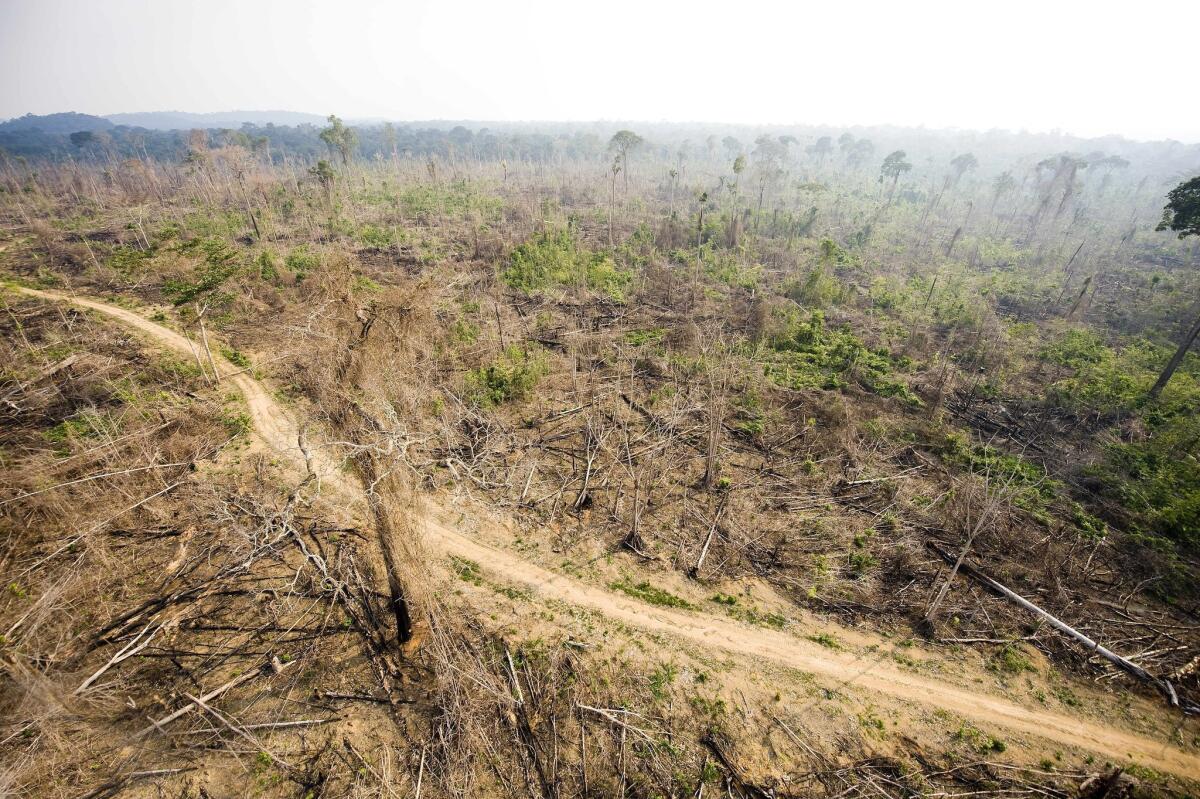U.S. joins other nations in deforestation accord at UN summit

- Share via
Reporting from New York — Moving to halt a powerful contributor to climate change, the United States has joined more than 110 corporations, civil society groups and governments to launch a global initiative to reduce deforestation sharply over the next 15 years, with the goal of eliminating the practice by 2030.
The “New York Declaration on Forests,” unveiled at the United Nations Climate Summit on Tuesday, would reduce between 4.5 billion and 8.8 billion tons of greenhouse gases annually, according to the United Nations Development Program. The effort would be equal to “removing from the road every car in the world, or not burning a trillion pounds of coal, or turning off every smokestack and tailpipe” in the U.S., the UNDP said.
Crafted as a marquee initiative at a summit long on rhetoric but short on concrete steps, the new deforestation initiative goes further than previous efforts, in the scope of participation and targets. Besides the U.S., participating states include wealthy nations that could help fund reforestation efforts, such as Canada, European Union members, Norway and the United Kingdom. Countries where deforestation is widespread, such as Indonesia and the Democratic Republic of Congo, have also signed on. Corporate participants include Walmart, McDonald’s, Danone, L’Oreal, agricultural giant Cargill and Asia Pulp and Paper, which until recently had been responsible for widespread deforestation.
Yet from the outset, problems in the initiative have emerged. China and India, two of the three largest carbon polluters in the world, have not signed on, though other participants can join later. Brazil, where deforestation is on the upswing after years of decline, has also declined to participate.
Greenpeace, the architect of a publicity campaign that pushed Asia Pulp and Paper to change its forestry practices, was among several deforestation activists absent from the accord. The group welcomed the plan, but said its voluntary commitments were too weak. Under the accord, countries and companies are not required to meet annual goals, signatories do not spell out how they plan to end deforestation and there is no system of verification or penalties for failing to miss targets.
“We need strong laws to protect forests and people, as well as better enforcement of existing laws,” said Kumi Naidoo, Greenpeace International executive director. “Halting the global loss of natural forests by 2030 and eliminating deforestation from agricultural commodities by 2020 at the latest would mean that years of continued forest clearance still lie ahead of us.”
Forests are critical to stabilizing temperatures because they absorb heat-trapping carbon dioxide. But mining, livestock pasturing and cultivation of commodity crops have fueled vast deforestation. The clear-cutting and burning of trees contributes about 15% of global greenhouse gas emissions. Up to 58,000 square miles of forest are lost annually, or the equivalent of 36 football fields every minute, according to the World Wildlife Fund.
The agreement calls for a 50% reduction in the rate of deforestation by 2020 before ending it altogether a decade later. Further, it calls for restoring 350 million hectares of forest and farmland, which is “an area greater than the size of India,” according to the UNDP.
Norway is expected to pledge about a half-billion dollars to help Liberia, Peru and various indigenous groups in the developing world curtail deforestation. It remains unclear what, if anything, other industrialized nations, including the U.S., will pay.
Brazil’s environment minister told the Associated Press that her country declined to participate in the pact, in part, because she worried the agreement’s goals would conflict with her country’s laws, which allow for logging in the Amazon.
“It’s different to have legal deforestation vs. illegal deforestation. Our national policy is we want to stop illegal deforestation,” said Brazilian Environment Minister Izabella Teixeira.
The lack of clarity in the agreement underscores its weakness, critics say. Even some backers concede a stronger agreement would have done more to protect forests and the climate—but it would have had far fewer participants. “We would like to go as far as Greenpeace wants to go, but the countries and companies aren’t there yet. So the agreement goes as far as it can,” said Charles McNeill, senior policy advisor in the Environment & Energy Group at the UNDP.
By signing on to the agreement, companies and governments have made a high-profile pledge for which the public will hold them accountable, McNeill said. He added: “This agreement doesn’t stop Greenpeace and other groups from holding their feet to the fire.”
More to Read
Sign up for Essential California
The most important California stories and recommendations in your inbox every morning.
You may occasionally receive promotional content from the Los Angeles Times.













